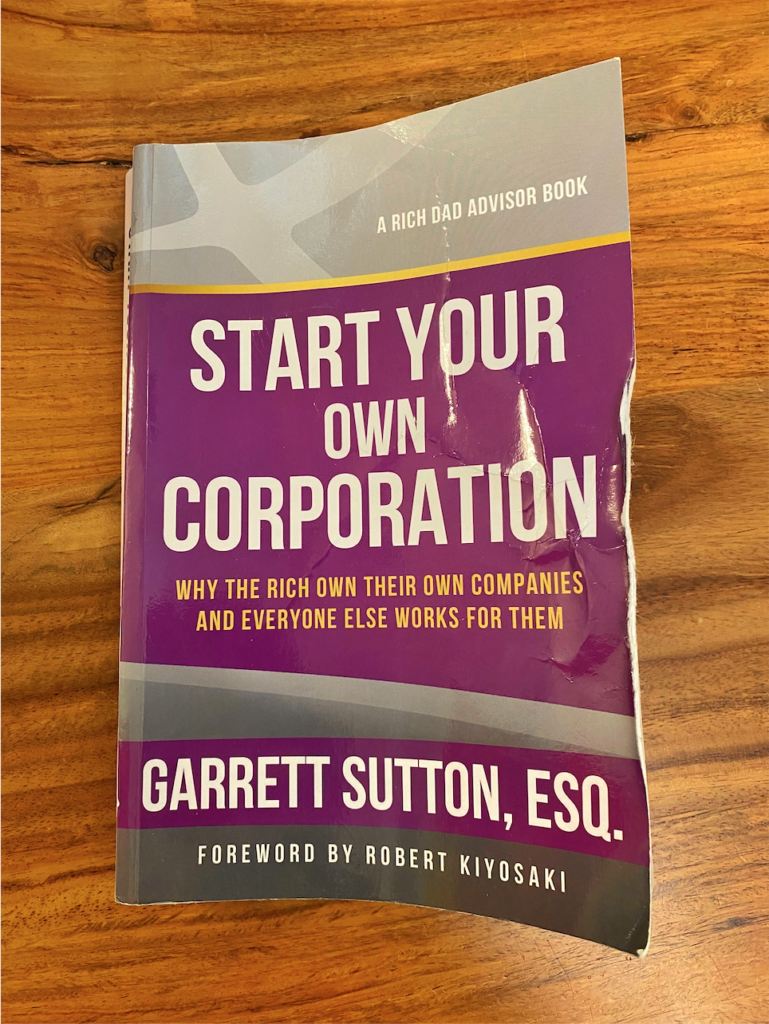I recently finished reading Start Your Own Corporation by Garrett Sutton. I found this book through reading Rich Dad Poor Dad by Robert Kiyosaki, which I had written a book review for.
For those who haven’t read Rich Dad Poor Dad, the main message of the book is that the truly rich derive their wealth from owning cash-generating assets, while everyone else trade their time for money in the form of a salary.
Rich Dad Poor Dad, however, is more big picture and doesn’t get into the technical details of actually starting your own businesses and building your portfolio of assets, which is why Kiyosaki recommended the works of Garrett Sutton.
Start Your Own Corporation is essentially a practical guide to the principles behind Rich Dad Poor Dad. It discusses the legal and technical details of how to start your own business entity, and offers advice on how to get your company off the ground.
For those who are new to business, Start Your Own Corporation is a helpful guide to starting your own company. In addition to covering the legal and technical basics of starting a business, it also goes over details such as which state(s) to incorporate, how to raise funds for your company, corporate formalities, business tax deductions, and other topics that would be of interest for business owners and entrepreneurs.
The most important part of the book for aspiring business owners is the first three chapters, which cover the list of business entities in the United States and explain why it is important to structure your company as a legal business entity in order to protect your assets and limit your liability. The menu of business entities in the United States include:
- C corporations
- S corporations
- Limited liability companies (LLCs)
- Limited Partnerships (LPs)
The book explains in detail each one of these entities, helping the reader understand which would work best in which situations. Knowing which business entities are available to you and how each one works is essential for every entrepreneur, which is why I consider the first three chapters incredibly important.
Another helpful way the book goes over the concepts is through case studies. When studying business, case studies help explain abstract and theoretical ideas by applying it to real world situations. At the end of the day, business is a practical skill, hence the importance of case studies. Sutton uses case studies throughout the book which gives readers the opportunity to see how the topics covered actually work in real life.
While the book starts off with essential information for new business owners and entrepreneurs, it gets more and more technical as it progresses. However, the later chapters are still helpful to know. Some business situations discussed may not come across every entrepreneur, but it’s useful to read just in case it does. Most likely, however, you will have specialists handling the more technical aspects of running a business that are covered in the later chapters. In fact, it would be foolish to manage some of these aspects yourself, rather than hiring professional lawyers and accountants to manage them for you. It would be inefficient for the chief executive to get bogged down in tax forms, audits, legal filings, etc. rather than delegate them to experts and focus on the doing business side of things instead.
My biggest criticism for the book is that it only discusses how to start a business entity in the United States. The United States is not necessarily the best country to incorporate. Many other countries have very business friendly laws and by ignoring them the book deprives the reader of learning about options that may be better for their business journey.
Additionally, there are many people who wish to do business outside of the United States or may not want to do business in the United States at all. If so, a more global perspective to the book would be useful.
Even for readers who do wish to do business primarily in the United States, it is possible that incorporating overseas may still be a better option. Many multinational companies domicile overseas, away from their primary country of operation, in order to take advantage of more business friendly laws.
Overall, I think Start Your Own Corporation by Garrett Sutton is a good guide for those new to starting a business. Many of the essential basics should be familiar to those who have already started a business, so the later chapters may be more helpful. However, the book focuses solely on the United States and fails to discuss overseas strategies that would be useful for business owners and entrepreneurs. Thus, I would say Start Your Own Corporation is a helpful guide, but because it lacks a global perspective it is by no means a comprehensive one.
If you would like to read Start Your Own Corporation by Garrett Sutton, here’s a link to order it on Amazon.
Start Your Own Corporation: https://amzn.to/3aWs5DA
Thank you for reading and make sure you subscribe to see more articles like this.
As an Amazon Associate I earn from qualifying purchases.
